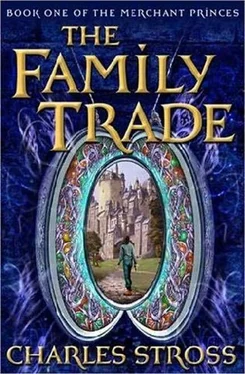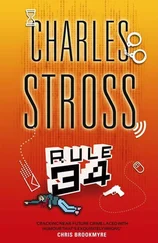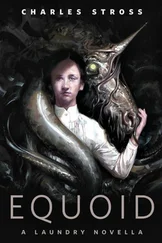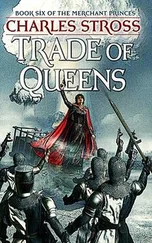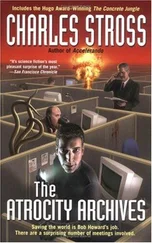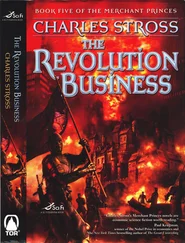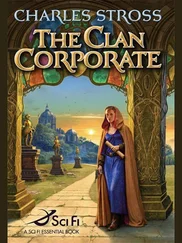Charles Stross
The Family Trade
(The Merchant Princes – 1)
For Steve and Jenny Glover
No novelist works in a creative vacuum. Whatever we do, we owe a debt to the giants upon whose shoulders we stand. This book might not have happened if I hadn’t read the works of H. Beam Piper and Roger Zelazny.
Nor would this book have been written without the intervention of several other people. My agent, Caitlin Blaisdell, nudged me to make a radical change of direction from my previous novels. David Hartwell of Tor encouraged me further, and my wife, Feorag, lent me her own inimitable support while I worked on it. Other friends and critics helped me in one way or another; I’d like to single out for their contributions my father, Jan Goulding, Paul Cooper, Steve Glover, Andrew Wilson, Robert “Nojay” Sneddon, Cory Doctorow, Sydney Webb, and James Nicoll. Thank you all.
WeatherMan
Ten and a half hours before a mounted knight with a machine gun tried to kill her, tech journalist Miriam Beckstein lost her job. Before the day was out, her pink slip would set in train a chain of events that would topple governments, trigger civil wars, and kill thousands. It would be the biggest scoop in her career, in any journalist’s career-bigger than Watergate, bigger than 9/11-and it would be Miriam’s story. But as of seven o’clock in the morning, the story lay in her future: All she knew was that it was a rainy Monday morning in October, she had a job to do and copy to write, and there was an editorial meeting scheduled for ten.
The sky was the colour of a dead laptop display, silver-gray and full of rain. Miriam yawned and came awake to the Monday morning babble of the anchorman on her alarm radio.
“-Bombing continues in Afghanistan. Meanwhile, in business news, the markets are down forty-seven points on the word that Cisco is laying off another three thousand employees,” announced the anchor. “Ever since 9/11, coming on top of the collapse of the dot-com sector, their biggest customers are hunkering down. Tom, how does it look from where you’re sitting-”
“Shut up,” she mumbled and killed the volume. “I don’t want to hear this.” Most of the tech sector was taking a beating. Which in turn meant that The Industry Weatherman’s readers-venture capitalists and high-tech entrepreneurs, along with the wannabe day traders-would be taking a beating. Her own beat, the biotech firms, were solid, but the collapsing internet sector was making waves. If something didn’t happen to relieve the plummeting circulation figures soon, there would be trouble.
Trouble. Monday. “I’ll give you trouble,” she muttered, face forming a grin that might have frightened some of those readers, had they been able to see it. “Trouble is my middle name.” And trouble was good news, for a senior reporter on The Industry Weatherman.
She slid into her bathrobe, shivering at the cold fabric, then shuffled along stripped pine boards to the bathroom for morning ablutions and two minutes with the electric toothbrush. Standing before the bathroom mirror under the merciless glare of the spotlights, she shivered at what she saw in it: every minute of her thirty-two years, in unforgiving detail. “Abolish Monday mornings and Friday afternoons,” she muttered grimly as she tried to brush some life into her shoulder-length hair, which was stubbornly black and locked in a vicious rear-guard action against the ochre highlights she bombarded it with on a weekly basis. Giving up after a couple of minutes, she fled downstairs to the kitchen.
The kitchen was a bright shade of yellow, cosy and immune to the gloom of autumn mornings. Relieved, Miriam switched on the coffee percolator and made herself a bowl of granola-what Ben had always called her rabbit-food breakfast.
Back upstairs, fortified by an unfeasibly large mug of coffee, she had to work out what to wear. She dived into her closet and found herself using her teeth to tear the plastic bag off one of the three suits she’d had dry-cleaned on Friday-only to discover it was her black formal interview affair, not at all the right thing for a rainy Monday pounding the streets-or at least doing telephone interviews from a cubicle in the office. She started again and finally managed to put together an outfit. Black boots, trousers, jacket, turtle-neck, and trench coat: as black as her Monday morning mood. I look like a gangster, she thought and chuckled to herself. “Gangsters!” That was what she had to do today. One glance at her watch told her that she didn’t have time for makeup. It wasn’t as if she had to impress anyone at the office anyway: They knew damned well who she was.
She slid behind the wheel of her four-year-old Saturn, and thankfully it started first time. But traffic was backed up, one of her wiper blades needed replacing, the radio had taken to crackling erratically, and she couldn’t stop yawning. Mondays, she thought. My favourite day! Not. At least she had a parking space waiting for her-one of the handful reserved for senior journalists who had to go places and interview thrusting new economy executives. Or money-laundering gangsters, the nouveau riche of the pharmaceutical world.
Twenty minutes later she pulled into a crowded lot behind an anonymous office building in Cambridge, just off Somerville Avenue, with satellite dishes on the roof and fat cables snaking down into the basement. Headquarters of The Industry Weatherman, journal of the tech VC community and Miriam’s employer for the past three years. She swiped her pass-card, hit the elevator up to the third floor, and stepped out into cubicle farm chaos. Desks with PCs and drifts of paper that overflowed onto the floor: A couple of harried Puerto Rican cleaners emptied garbage cans into a trolley laden with bags, to a background of phones ringing and anchors gabbling on CNN, Bloomberg, Fox. Black space-age Aeron chairs everywhere, all wire and plastic, electric chairs for a fully wired future.
“’Lo, Emily,” she nodded, passing the departmental secretary.
“Hi! With you in a sec.” Emily lifted her finger from the “mute” button, went back to glassy-eyed attention. “Yes, I’ll send them up as soon as-”
Miriam’s desk was clean: The stack of press releases was orderly, the computer monitor was polished, and there were no dead coffee cups lying around. By tech journalist standards, this made her a neat freak. She’d always been that way about her work, even when she was a toddler. Liked all her crayons lined up in a row. Occasionally she wished she could manage the housework the same way, but for some reason the skill set didn’t seem to be transferable. But this was work, and work was always under control. I wonder where Paulie’s gotten to?
“Hi, babe!” As if on cue, Paulette poked her head around the side of the partition. Short, blonde, and bubbly, not even a rainy Monday morning could dent her enthusiasm. “How’s it going? You ready to teach these goodfellas a lesson?”
“ ‘Goodfellas?’” Miriam raised an eyebrow. Paulette took the cue, slid sideways into her cubicle, and dropped into the spare chair, forcing Miriam to shuffle sideways to make room. Paulie was obviously enjoying herself: It was one of the few benefits of being a research gofer. Miriam waited.
“Goodfellas,” Paulette said with relish. “You want a coffee? This is gonna take a while.”
“Coffee.” Miriam considered. “That would be good.”
“Yeah, well.” Paulette stood up. “Read this, it’ll save us both some time.” She pointed out a two-inch-thick sheaf of printouts and photocopies to Miriam, then made a beeline for the departmental coffeepot.
Читать дальше
